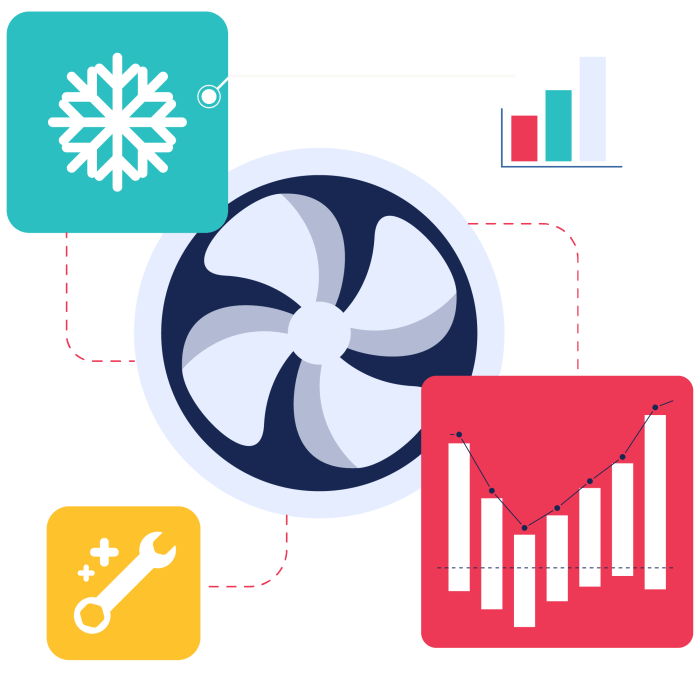HVAC field service software is revolutionizing the HVAC industry, transforming how technicians manage schedules, track inventory, and interact with clients. This powerful technology streamlines operations, boosting efficiency and profitability for businesses of all sizes. From scheduling appointments and dispatching technicians to generating invoices and managing customer relationships, HVAC field service software offers a comprehensive solution for managing all aspects of a field service operation.
The software’s ability to automate tasks frees up valuable time for technicians to focus on what they do best: providing quality service. Features like mobile accessibility, real-time tracking, and integrated payment processing enhance customer satisfaction and create a more seamless workflow. Furthermore, data analytics provided by the software allows businesses to identify trends, optimize routes, and make data-driven decisions for continuous improvement.
The HVAC industry, characterized by its intricate service requirements and geographically dispersed operations, significantly benefits from the implementation of robust field service software. This technology streamlines various aspects of the business, from scheduling and dispatching to invoicing and customer relationship management (CRM). Choosing the right HVAC field service software can significantly improve efficiency, reduce operational costs, and enhance customer satisfaction.
This comprehensive guide delves into the key features, benefits, and considerations involved in selecting and implementing such software.
Key Features of Effective HVAC Field Service Software
A comprehensive HVAC field service management solution goes beyond basic scheduling. It integrates several crucial functionalities to optimize every stage of the service process. Here are some key features to look for:
Scheduling and Dispatching
- Real-time scheduling and optimization: The software should allow for dynamic scheduling based on technician availability, location, and customer preferences, minimizing travel time and maximizing service appointments.
- Automated appointment reminders: Reduce no-shows and improve customer communication through automated email and SMS reminders.
- Drag-and-drop scheduling interface: Intuitive interfaces simplify scheduling and make it easy for dispatchers to manage technician workloads.
- GPS tracking and navigation: Real-time tracking of technicians allows for efficient dispatching and improved response times.
Job Management and Tracking, Hvac field service software
- Detailed job creation and assignment: The software should facilitate the creation of detailed job descriptions, including customer information, equipment details, and service requirements.
- Digital work orders and forms: Eliminate paperwork by using digital work orders that technicians can access on mobile devices. Pre-filled forms can speed up data entry.
- Inventory management: Track parts and supplies in real-time, reducing stockouts and improving efficiency.
- Progress tracking and reporting: Monitor the progress of jobs in real-time, identifying potential delays and bottlenecks.
Customer Relationship Management (CRM)
- Centralized customer database: Maintain a comprehensive record of customer information, including service history, preferences, and communication details.
- Automated communication: Send automated emails and SMS messages for appointment confirmations, service updates, and follow-ups.
- Customer portal access: Allow customers to access their service history, schedule appointments, and make payments online.
- Customer feedback and review management: Collect customer feedback to identify areas for improvement and enhance customer satisfaction.
Reporting and Analytics
- Real-time dashboards: Monitor key performance indicators (KPIs) such as technician utilization, job completion rates, and customer satisfaction.
- Customizable reports: Generate customized reports to track various aspects of the business, such as revenue, expenses, and profitability.
- Data export capabilities: Export data to other systems for further analysis and reporting.
Integration Capabilities
- Accounting software integration: Seamlessly integrate with accounting software to automate invoicing and payment processing.
- CRM integration: Integrate with CRM systems to improve customer relationship management.
- Mapping and navigation integration: Integrate with mapping and navigation services for optimal route planning.
Benefits of Using HVAC Field Service Software
Implementing HVAC field service software offers numerous advantages, leading to improved efficiency, reduced costs, and enhanced customer satisfaction. These benefits include:

Source: frontu.com
- Improved scheduling and dispatching: Optimize technician routes, reduce travel time, and maximize service appointments.
- Increased technician productivity: Streamline workflows, reduce administrative tasks, and empower technicians to focus on service delivery.
- Reduced operational costs: Minimize fuel consumption, reduce paperwork, and improve inventory management.
- Enhanced customer satisfaction: Improve communication, provide timely service, and build stronger customer relationships.
- Better data-driven decision making: Access real-time data and generate reports to identify areas for improvement and optimize business strategies.
- Improved revenue management: Track invoices, payments, and expenses efficiently, leading to improved cash flow and profitability.
Choosing the Right HVAC Field Service Software
Selecting the right software requires careful consideration of your specific needs and requirements. Here are some key factors to consider:
- Scalability: Ensure the software can adapt to your growing business needs.
- Integration capabilities: Check for compatibility with existing systems, such as accounting and CRM software.
- User-friendliness: Choose software with an intuitive interface that is easy for your technicians and office staff to use.
- Mobile accessibility: Ensure the software is accessible on mobile devices for technicians in the field.
- Customer support: Look for a vendor that offers reliable customer support and training.
- Pricing and licensing: Consider the cost of the software, including licensing fees, implementation costs, and ongoing maintenance.
Frequently Asked Questions (FAQ)
- Q: What is the average cost of HVAC field service software? A: The cost varies depending on the features, number of users, and vendor. Expect to pay anywhere from a few hundred dollars per month to several thousand dollars per year.
- Q: How long does it take to implement HVAC field service software? A: Implementation time varies depending on the complexity of the software and the size of your business. It can range from a few weeks to several months.
- Q: What are the key benefits of using mobile apps for field service technicians? A: Mobile apps provide real-time access to job details, customer information, and work orders, improving efficiency and reducing paperwork.
- Q: How can HVAC field service software improve customer satisfaction? A: By improving communication, providing timely service, and offering convenient online access to information and services.
- Q: Does the software integrate with my existing accounting system? A: Many HVAC field service software solutions offer integration with popular accounting software packages. Check the vendor’s specifications to ensure compatibility.
Conclusion
Investing in the right HVAC field service software is a strategic move towards optimizing operations and enhancing customer satisfaction. By carefully considering the key features, benefits, and selection criteria Artikeld in this guide, businesses can make an informed decision that will significantly improve their efficiency and profitability. The transition to a digital workflow will streamline processes, empower technicians, and ultimately lead to a more successful and sustainable HVAC business.
References
While specific software names are avoided to maintain neutrality, research reputable sources like Gartner, Capterra, and G2 to compare and contrast various HVAC field service software options. These platforms offer reviews, comparisons, and user feedback to aid in your decision-making process.
Call to Action
Ready to streamline your HVAC business operations and boost your bottom line? Contact us today for a free consultation and discover how the right field service software can transform your business!
In conclusion, adopting HVAC field service software represents a significant step towards modernizing and optimizing HVAC businesses. The benefits, ranging from increased efficiency and improved customer service to enhanced data-driven decision-making, are undeniable. By embracing this technology, HVAC companies can position themselves for success in an increasingly competitive market and achieve sustainable growth.
Commonly Asked Questions
What are the typical costs associated with HVAC field service software?
Costs vary widely depending on the features, scalability, and vendor. Expect monthly subscription fees or one-time purchase options, ranging from a few hundred to several thousand dollars annually.
How easy is the software to learn and use?

Source: fieldpoint.net
Most reputable vendors prioritize user-friendliness. Many offer training resources and intuitive interfaces designed to minimize the learning curve. However, the ease of use can depend on the specific software and your team’s tech proficiency.
Can the software integrate with my existing accounting or CRM systems?
Many HVAC field service software solutions offer seamless integration with popular accounting and CRM platforms. Check the software’s specifications to ensure compatibility with your current systems.
What level of technical support is typically provided?
Support options vary, but reputable vendors generally offer phone, email, and online resources. Some may provide dedicated account managers or priority support for larger clients.